-
Bestseller

-
Bestseller

-
Bestseller

-
Bestseller

₹ 459
₹ 459
Regular price M.R.P: 100% Natural
100% Natural
 No Harsh Ingredients
No Harsh Ingredients
 Ayurvedic Herb
Ayurvedic Herb
 Quality Check
Quality Check
 Wildcrafted
Wildcrafted
Manufactured by : HempCann Solutions Pvt Ltd.
Need Assistance : +91-22-48931316
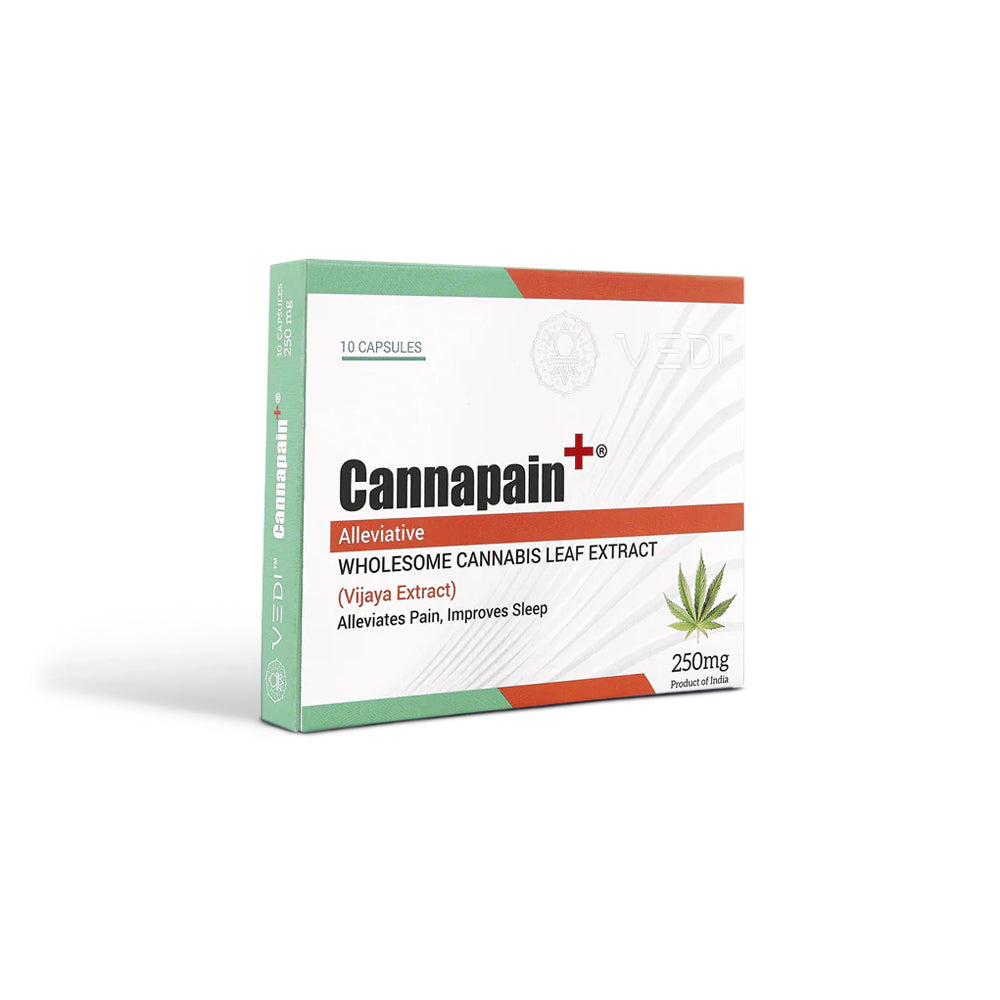
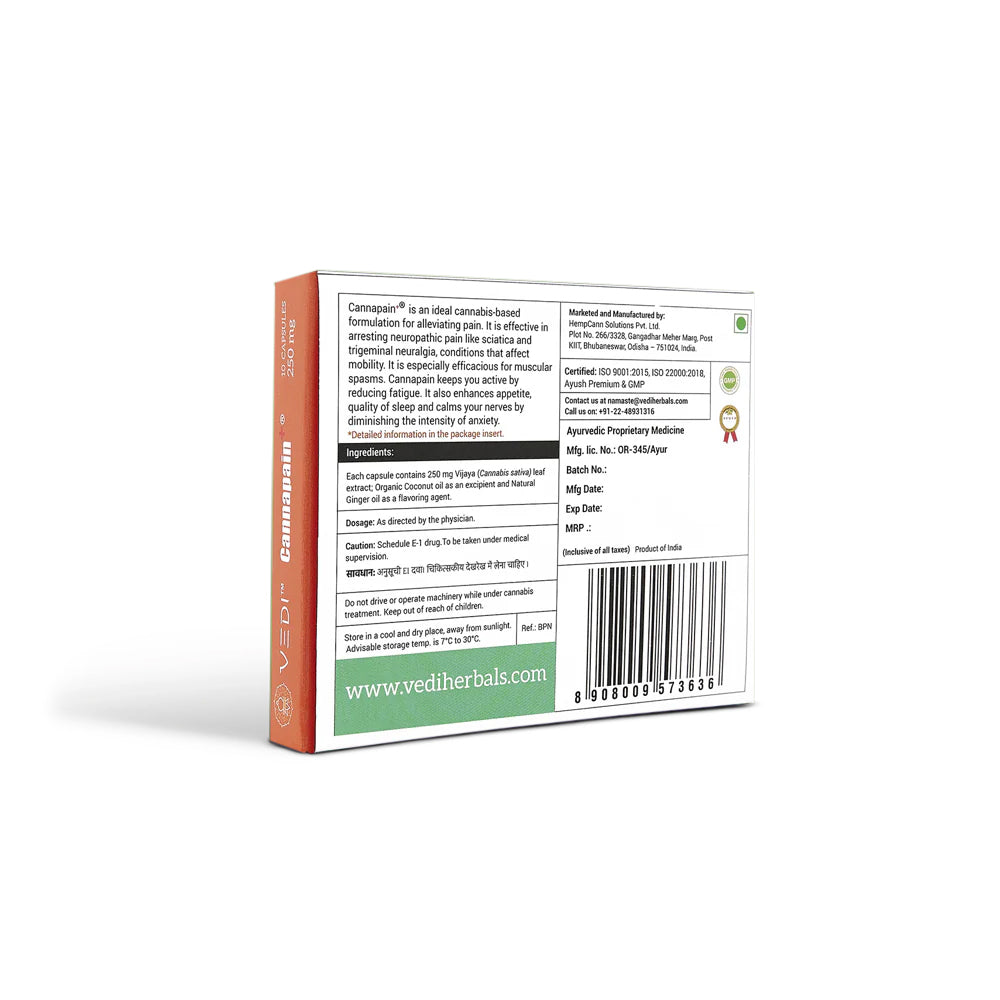
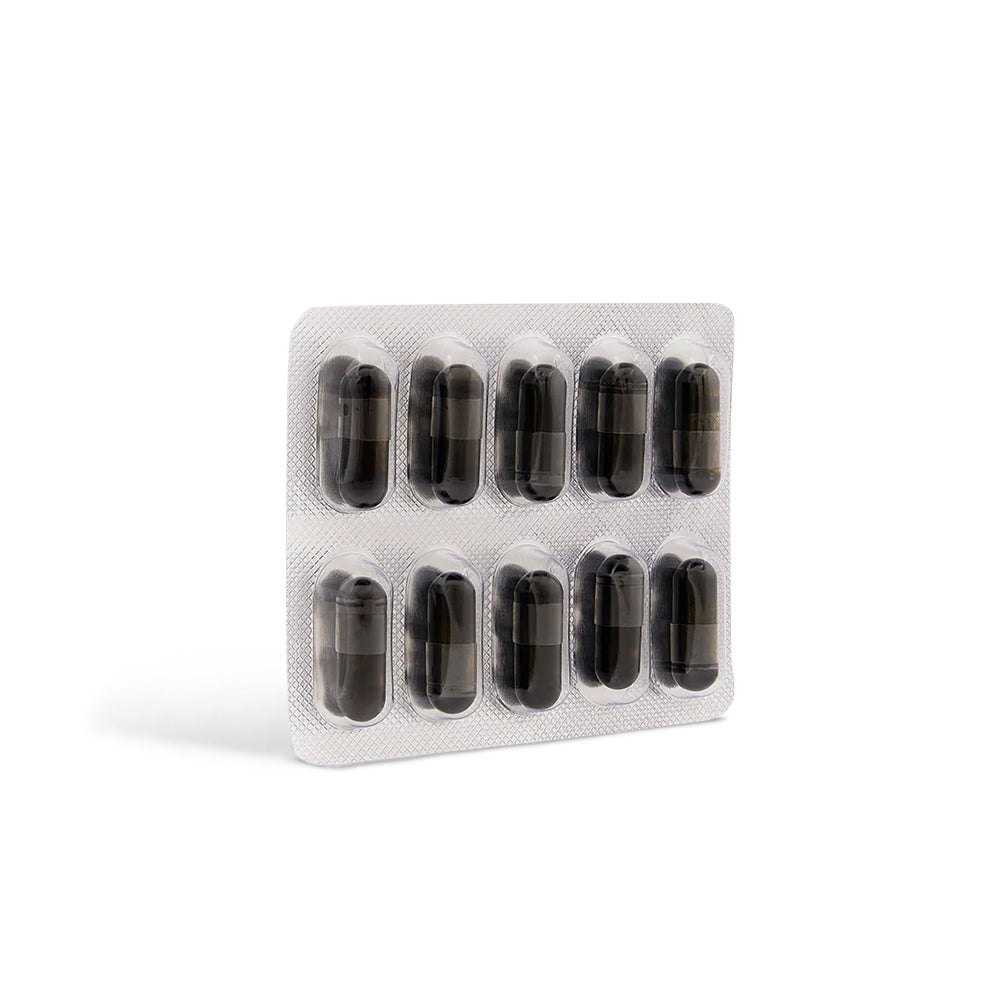

Description
Cannapain+® is an ideal cannabis-based formulation for alleviating various kinds of aches and pain. It is effective in arresting neuropathic pain like sciatica and trigeminal neuralgia, conditions that affect mobility. This medicine is especially efficacious for muscular spasm. Cannapain keeps you active throughout the day by reducing fatigue. It also enhances appetite and quality of sleep. It helps calm your nerves by diminishing the intensity of anxiety.
This medicine is FREE from chemicals, artificial flavors or sweeteners, sugar, salt, gluten, soy, pesticides and heavy metals.
HOW IT WORKS?

Mechanism of action
Mechanism of action
Endocannabinoid system is a collection of neuromodulators (endocannabinoids), their receptors (CB1 & CB2) and signaling pathways in our body. It regulates the body’s physiological system to maintain homeostasis (the state of balance). Phyto-cannabinoids (CBD & THC) bind mainly to CB1 and CB2 receptors and specific enzymes & metabolites to activate the pathways and regulate the symptoms.
This is made using full-spectrum cannabis extract infused in coconut oil. The high grade organic coconut oil boosts the absorption of cannabinoids because it allows easy absorption in the digestive tract and metabolism in liver. Infusion of cannabinoids in coconut oil thus boosts the bioavailability of cannabinoids and helps in breaking down the cannabinoid-coconut oil complex in liver for immediate effect.

Therapeutic benefits
- ✔ Chronic Pain/ Neuropathic pain/ Sciatica: It is evident from research that cannabinoids such as THC and CBD in 1:1 ratio produce analgesia by acting on multiple pain targets within the peripheral and CNS along with the activation of CB1 and CB2 receptors. They may reduce pain through interaction with the putative non-CB1/CB2 cannabinoid G protein-coupled receptors (GPCR55 or GPCR18)and opioid or serotonin (5-HT) receptors. A 1:1 ratio of CBD:THC has been found effective for chronic pain and chemotherapy induced neuropathic pain.
- ✔ CINV (Chemotherapy Induced Nausea and Vomiting): Acute CINV occurs within 24 hours of initiating chemotherapy and mainly involves receptors in the GI tract and is primarily mediated by activation of receptors in the brain. THC (delta(Δ)9-tetrahydrocannabinol) binds to cannabinoid receptors CB1 & CB2 that are located throughout the body, including in the brain (CB1) and the immune system (CB2). Activation of CB1 by THC can have medically desirable effects, such as decreasing the incidence of nausea and vomiting. The addition of CBD (Cannabidiol) to THC should ameliorate the intoxicating effects of THC, and allow delivery of higher therapeutic doses, without increasing the overall intoxication, paranoia and euphoria associated with THC, with diminished potential for abuse.
- ✔ Anxiety & Depression: CB1 and lower peripheral concentrations of anandamide or N-arachidonoylethanolamine (AEA), the endogenous ligand of CB1, is involved in the pathophysiology of anxiety, and activation of CB1 and increased concentration of THC (structurally similar to anandamides) and CBD (Structurally similar to AEA) appears to be inversely correlated to symptoms of anxiety and depression.
- ✔ Appetite loss: Appetite signal is passed to brain by a hormone called ghrelin. Insufficient release of this hormone is the main cause of appetite loss. This medicine triggers a ghrelin surge and stimulates appetite.
- ✔ Seizures: A seizure happens when the brain’s electrical activity becomes deregulated and all the neurons fire repeatedly at the same time. Activation of CB1 receptor controls the firing of neurons and thus helps in controlling seizures.
HOW TO USE IT?
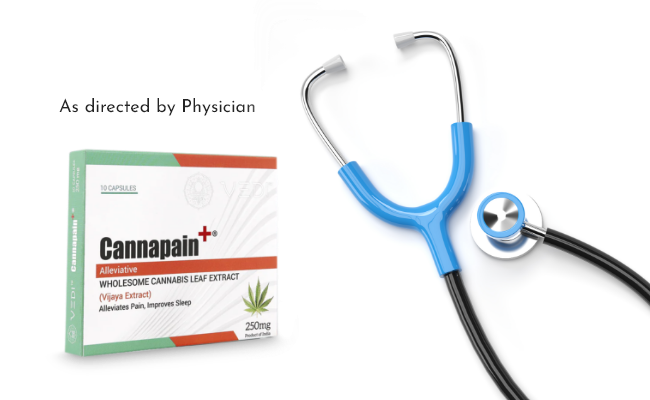
Dosage
Dosage
It is advisable to start with low dose as dosage may vary according to disease state and conditions.
Dose may also vary from person to person depending on a person’s tolerance level. It is best to follow a physician’s advice to find the right dose.
MADE WITH
HPMC veg capsule filled with 250mg Cannabis leaves wholesome extract, organic cold pressed coconut oil and ginger oil.
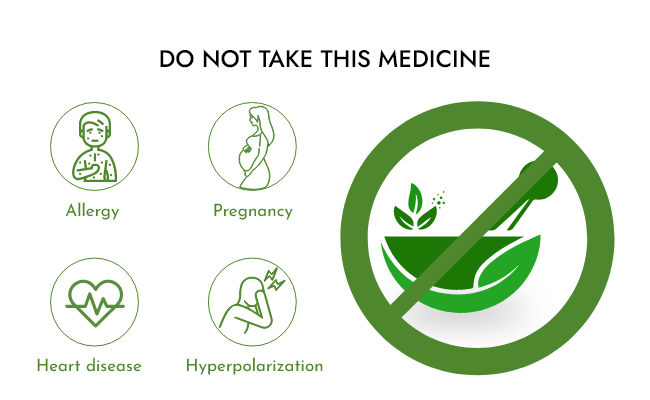
Precautions
- Allergy: DO NOT take this medicine if you are allergic to Cannabis or any of the ingredients contained in this drug
- Pregnancy: Breast feeding mothers and pregnant women should take Cannapain+® strictly under Doctor's supervision and guidance.
- Heart disease: It might increase heartbeat, and fluctuations in blood pressure. Patients suffering from heart diseases should take this under strict Doctor’s guidance and supervision.
- Surgery: It might slow down the effect of anesthesia when combined with anesthesia and other medications during and after surgery. Stop taking it at least 2 weeks before a scheduled surgery.
- Keep away from Children.
- DO NOT drive or operate any machine while under Cannabis medication.
- DO NOT take Alcohol while under Cannabis medication.

DRUG INTERACTION
- Taking Cannapain+® is LIKELY SAFE and can be taken with most drugs. However, it is best to consult your doctor before starting and sharing the list of all medications to find out drug interactions.
- Drugs for Sedative medications (Barbiturates & CNS depressants): Taking Cannapain+® along with sedative medications might cause too much sleepiness. With fluoxetine, it might cause you to feel irritated, nervous, jittery and excited. Doctors call this hypomania.
- Drugs for Alcohol de-addiction: Taking Cannapain+® along with drugs for alcohol de-addiction i.e., Disulfiram can cause agitation, trouble sleeping and irritability.
- Drugs that control blood sugar level: No conclusive evidence found for such kind of drug interaction. However it is considerably safe to take with drugs that control blood sugar level.
- This drug can also interact with Astemizole, Cisapride, Pimozide & Terfenadine. So it is advisable not to take Cannapain+® with these drug combinations.
REFERENCES
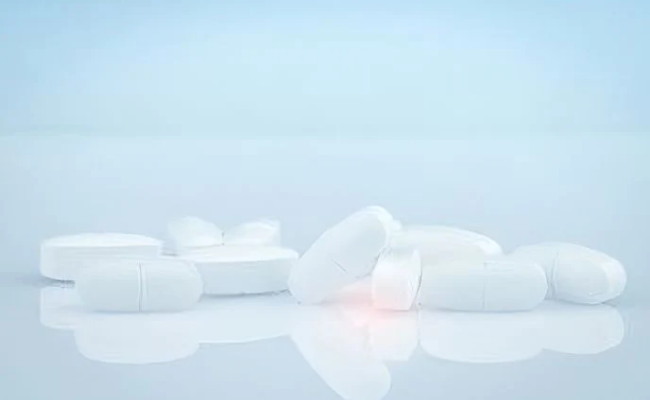
-
- - Vučković S. et al. Cannabinoids and Pain: New Insights From Old Molecules. Frontiers in pharmacology, 2018, 9: 1-19. 5
- - Wilsey BL. et al., A preliminary evaluation of the relationship of cannabinoid blood concentrations with the analgesic response to vaporized cannabis. J. Pain Res., 2016, 9: 587–598.
- - Wilsey BL. et al., Low-dose vaporized cannabis significantly improves neuropathic pain. J. Pain., 2013. 14: 136–14
- - Reddy DS. & Golub VM., The Pharmacological Basis of Cannabis Therapy for Epilepsy. J Pharmacol Exp Ther., 2016, 357:45–55.
The product is really effective. Helps relax , sleep better and has positive effects on overall well-being . Vedi’s team consistently provide great services in addition to the great product
I've been using Vedi Herbals' Cannapain+ since 2020, and it's been a game-changer for me. This product has not only helped improve my appetite but has also eased my anxiety. I love its effectiveness and how it has positively impacted my daily life. My only gripe is the occasional price increases that seem to pop up every few months. Despite that, I'm grateful for this product's consistent quality and results!
Vedi herbals medication is organic, ayurvedic and making the difference in my life that western medicine couldn't. Insomnia is much more manageable after using Cannapain.
Being in software industry with long working hours sitting and constantly staring at computer screen, I had started developing issues with bad postures resulting in back and wrist pain. On top of that, constant chaotic work also takes a toll on my mental health.
Being able to have this magical medicine allows me to get a relief from body ache(without relying on allopathic medicines). While it doesn't substitute exercise in any way, it still helps to a great extent. Also get a pretty deep sleep with this and feel much more relaxed the next day.





